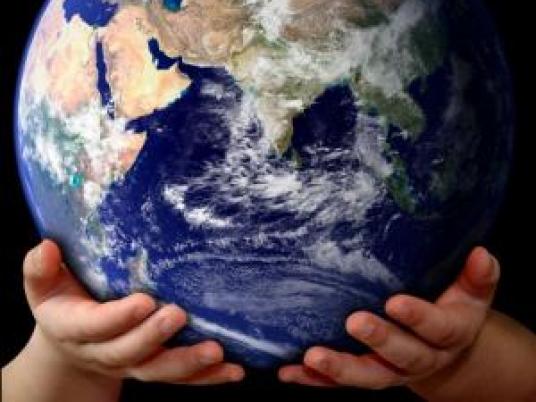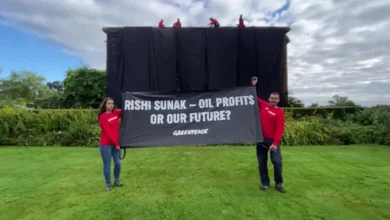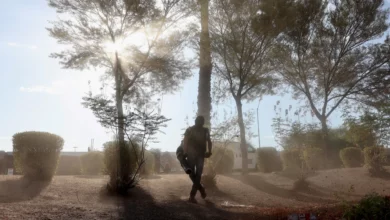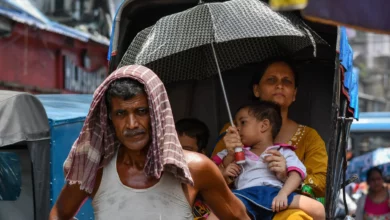
"If you let a monkey choose if he wants a banana now or six bananas later, the monkey will always choose a banana now. It seems like many of these adults think a little like this monkey," Felix Finkbeiner, a 14-year-old German kid, says while addressing climate change and the tendency of decision-makers to delay immediate and effective actions for climate justice. When he was just nine years old, Finkbeiner was inspired by a school report to start the initiative Plant-for-the-Planet, which aims to have children plant 1 million trees in each country in an effort to tangibly fight climate change. Egypt has its own creative and equally enthusiastic little Felix.
The 9th Cairo Climate Talks, a series of monthly events meant to provide a platform to exchange experience on different topics, held in cooperation with the German Academic Exchange service (DAAD) among the others, hosted a panel discussion on Wednesday night titled "Education for the Future –– Youth against Climate change," with the screening of the German documentary "Weil ich länger lebe als Du" ("Because I live longer than you"). While the documentary presented the initiative started by Finkbeiner and carried on by other children all over the world, the discussion shed the light on some interesting environmental projects developed by young students in Egypt.
"We kids see two main crises," Finkbeiner explains to the public at DAAD through a video he sent from Germany, "the poverty and the climate crisis." That is why the documentary also show the initiatives of kids in developing countries to not only fight against climate change but also against poverty. "We youth have to fight against climate change. In a few years we will have to live with all the problems that haven't been solved today and we won't be able to take the adults into account for the problems they haven't solved and they will probably be dead by that time." The passion, and the genuine enthusiasm and outspokenness of Felix as well as that of the other kids are compelling.
Environmental education in schools is essential, according to Simone Jore, project director of “Schools: Partners of the Future” at the Goethe Institut in Cairo. “By working on their own initiatives, children learn that they live in an interconnected world and that they can impact the environment, their families and neighborhood and, very importantly, their school. The skills that they can learn can change their future behavior.”
In order for children to fully learn and integrate what they read in their daily life, the practical application of theoretical knowledge is essential. That is why environmental education should also be implemented on the ground, as Barbara Pampe, professor at the Faculty of Architecture and Urban Design at the German University of Cairo, suggested. Pampe presented the project she co-initiated and coordinated, “Learn-Move-Play-Ground,” which aims to improve the courtyards of public and primary schools.
The Summer School, organized as part of the project, is currently completing the 12-day-workshop opened to 10 German and 25 Egyptians students, who already completed the fourth semester of architecture, urban planning or landscape architecture studies. During the project, students presented and are currently implementing solutions to improve the courtyards of two Cairo Schools, al-Quds in Ard al-Lewa and Kobet al-Hawa in Shubra.
The children who presented their environmental projects from different schools, showing incredible passion, awareness and deep concern with the current problems affecting the environment and as a consequence their future, were evidence of how practical application can deeply shape their behavior for the better.
Mourad Farahat, 11th Grade student at Europa-Schule Kairo, is part of the “youTHINKGREEN” project joined by his school. “If i was a normal student,” the 16-year-old student explains, “I would say I'm interested in such a matter because it's more fun than a physics class. But I'm not. I'm part of an international initiative which recognizes the importance and the magnitude of the problem we're facing right now.” Farahat’s group has realized the consequences of “what you won't see, we will see,” and decided to start a recycling initiative in the school to avoid the future exacerbation of these problems.
Aisha Abdel Hady, a 16-year-old girl from the German School in Alexandria, passionately explains to Egypt Independent the successful project she has been working on with the school's environmental club. The group of 15 students decided to help save the environment by installing solar panels in their school. To reach their goal, they've decided to start a recycling project that can improve their school’s conditions and save money to buy the solar panels, which cost LE5000. In collaboration with a recycling company, the students supervise the recycling of paper and plastic that is then sold to the company. "We put special bins in each classroom marked with white so students know it's for paper," Abdel Hady explains. "We sort out paper and we sell it to a recycling company that pays us LE700 for each ton of clean paper and plastic we give to them."
Adam Omar Khalaf represents the project developed by the Deutsche Schule Futures in Rehab City. He is 14 years old and his passion for environmental issues is tangible. Khalaf explains to Egypt Independent every step of their experiment aiming at recycling paper. With his class, he went to the zabaleen (garbage collectors) area to observe their recycling techniques and think of solutions to solve one of the biggest problems of Egypt, garbage collection. "I get very angry when people throw garbage in the streets,” Khalaf says. “I always say to people that they can't do it in my presence." And, after some hesitation, he adds, "Well, they shouldn’t do it when they are alone either. Did I explain it well?" He adds, "I hope you don't say I was good just to make me happy."
Adam represents the youth, and the hope that things can change with enthusiasm, awareness and direct participation to real change. As the Plant-for-the-Planet campaign reminds us, “Stop talking, start planting.”




